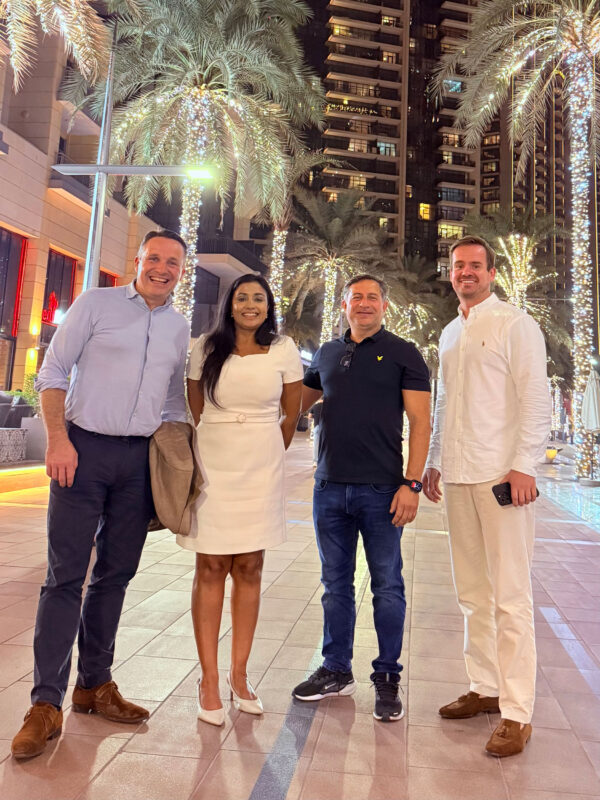GITEX Global and Expand North Star have confirmed the Gulf’s rise as a global hub for technology and investment. From AI and fintech to climate tech and smart cities, this year’s events showed where capital is heading next. Kylla’s Investment Manager, Sevde Asan, shares insights from Dubai on the innovations and partnerships shaping tomorrow’s markets. Continue reading to see how Kylla connects investors and founders across borders.
I had the privilege of attending both GITEX Global 2025 and Expand North Star 2025 in Dubai this October. Having spent much of my professional time between Sweden and Dubai, I witnessed firsthand how Dubai has become a genuine crossroads for innovation and capital. These events showed not only the technologies shaping the future but also the investment logic that will drive them forward.
Dubai’s technology fortnight did more than set exhibition records. It revealed where capital is heading next. The two events brought together founders, corporates, policymakers, and investors at a scale that few global venues can match. For professional investors and corporate finance executives, the message was clear, the Gulf is now a central hub where policy, infrastructure, and capital align to scale technology globally.
Why this year matters
This year’s editions were the largest yet, attracting over 140,000 attendees, 6,800 exhibitors, and 2,000 startups and 1,200 investors from 180 countries. That density of supply and demand created an environment of intense deal-making and partnership building. For founders, Dubai is increasingly the place to meet global enterprise buyers and regulators. For investors, it is the fastest route to national programmes, sovereign partners, and late-stage corporates capable of taking pilots to commercial rollout.
Together, these record numbers created a clear picture of where technology and capital are converging. The conversations and announcements across the exhibition floors revealed five dominant themes that will shape the region’s—and indeed the world’s—investment agenda in the years ahead.

Theme 1 – AI as infrastructure
Artificial intelligence dominated both events, not just as a software layer but as a national infrastructure strategy. du’s AI Park in Warsan – a 44-hectare campus with liquid-cooled data centres and 1 gigawatt capacity – was one of several announcements showing the region’s sovereign-grade approach to compute.
Abu Dhabi’s TAMM AutoGov, an AI-powered digital public servant, and Dubai’s Invest in Dubai 360 platform signalled that government adoption will drive enterprise AI demand. For investors, that means revenue backed by policy. AI here is capex-intensive and attracts sovereign wealth, strategic corporates, and infrastructure funds, creating opportunities for co-investment and vendor financing.
Theme 2 – Fintech and digital assets mature
At Future Blockchain Summit x Fintech Surge, the conversation shifted from hype to infrastructure. Regulators, exchanges, and banks debated CBDCs, tokenisation, and cross-border payments. This signals the institutional phase of fintech. The upgraded Invest in Dubai platform and DIFC’s streamlined licensing now make market entry faster and cheaper, opening the door for embedded finance, Islamic fintech, and new payment corridors.
Theme 3 – Climate tech: the region’s funding gap and opportunity
Sustainability featured prominently at Expand North Star’s new Green Impact zone. The investment story is compelling, Gulf investors committed US$3.49 billion to climate tech abroad, but only US$35 million locally. That gap represents a structural opportunity.
With MENA climate-tech funding at US$631 million in 2023, policy-aligned projects in energy, water, and circularity are well positioned for early institutional capital. Expect sovereign and development funds to seed local ventures, with corporates acting as first customers.
Theme 4 – Health tech and bioinnovation near deployment
Digital health and biotech gained new visibility. AI-driven diagnostics, neuro-interfaces, and personalised medicine platforms drew strong attention from sovereign hospitals and private healthcare groups. For investors, that mix of public demand and policy support reduces uncertainty.
Theme 5 – Smart cities and mobility: the city as a sandbox
Dubai used GITEX to show how infrastructure and policy integrate. The Invest in Dubai 360 portal compresses setup times for new ventures, while in mobility the RTA previewed autonomous public-transport projects and Dubai Police showcased AI-equipped patrol vehicles. These are concrete indicators that the city itself serves as a testbed for scalable innovation.
Takeaways for investors
These are the three clearest signals for investors emerging from Dubai’s 2025 tech week, each pointing to where capital, policy, and innovation are most closely aligned.
- AI will be financed as infrastructure. Government demand and sovereign capital underpin the market, offering stable offtake for investors in compute and cloud.
- Fintech is entering the institutional phase. Regulation is catching up, de-risking cross-border payment and tokenisation ventures.
- Climate tech is under-owned locally. Redirecting part of outbound climate allocations back into GCC projects offers policy-supported upside.
Looking ahead
At Kylla, we see Dubai’s ecosystem as a live laboratory for capital formation. Our focus now includes co-investment in AI and digital infrastructure, advisory for fintech entrants navigating UAE regulation, and channelling regional climate capital into viable local ventures.
As someone who divides his time between Sweden and Dubai, I am struck by how swiftly the UAE has moved from showcasing innovation to deploying it. The conversation is no longer about potential; it is about execution and scale.
If you are an investor, founder, or corporate executive exploring how to connect across these regions, Kylla stands ready to help structure partnerships that travel well – turning the momentum of Dubai’s tech week into real, cross-border results.
Investment Manager
Kylla Corporate Transactions




